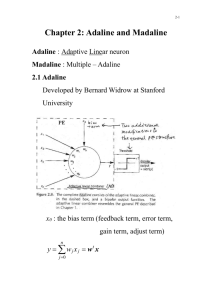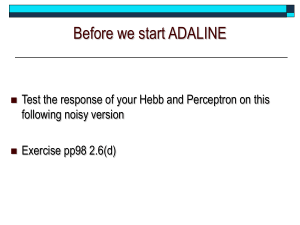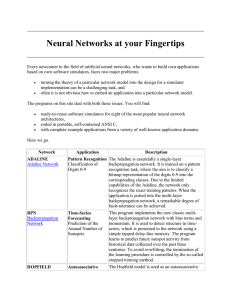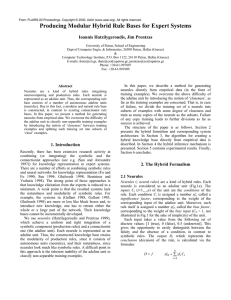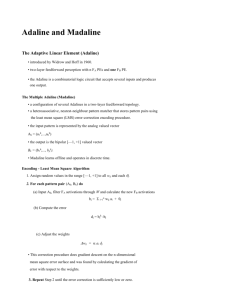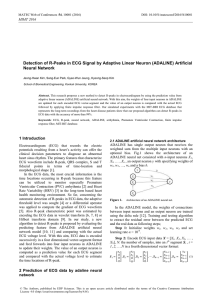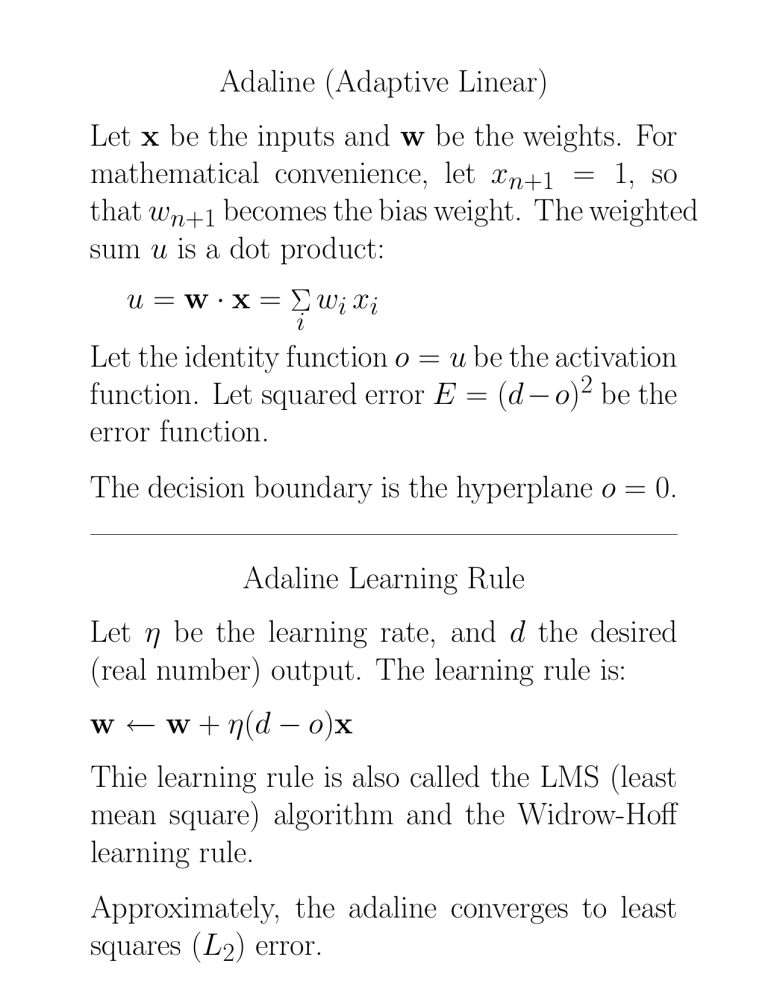
Adaline (Adaptive Linear) Let x be the inputs and w be the weights. For mathematical convenience, let xn+1 = 1, so that wn+1 becomes the bias weight. The weighted sum u is a dot product: u = w · x = Σ wi xi i Let the identity function o = u be the activation function. Let squared error E = (d − o)2 be the error function. The decision boundary is the hyperplane o = 0. Adaline Learning Rule Let η be the learning rate, and d the desired (real number) output. The learning rule is: w ← w + η(d − o)x Thie learning rule is also called the LMS (least mean square) algorithm and the Widrow-Hoff learning rule. Approximately, the adaline converges to least squares (L2) error. Justifying the Learning Rule The adaline learning rule is justified by gradient descent: ∂E ∂(o − d)2 ∂o = = 2(o − d) ∂w ∂w ∂w ∂u ∂w · x = 2(o − d) = 2(o − d) ∂w ∂w = 2(o − d)x Moving in direction (o − d)x increases error, so the opposite direction (d − o)x decreases error. Adaline Example (η = 0.1) x1 x2 x3 1 1 1 1 −1 −1 −1 −1 1 1 −1 −1 1 1 −1 −1 d u 1 1 0.00 −1 −1 0.20 1 1 0.20 −1 −1 −0.08 1 1 0.38 −1 −1 −0.28 1 1 0.52 −1 1 −0.43 w1 0.00 0.10 −0.02 0.06 −0.03 −0.09 −0.02 −0.07 −0.21 w2 0.00 0.10 −0.02 −0.10 −0.01 0.05 −0.02 −0.07 −0.21 w3 0.00 0.10 0.22 0.30 0.39 0.45 0.53 0.57 0.43 w4 = b 0.00 0.10 −0.02 0.06 −0.03 0.03 −0.04 0.00 0.15 In 4 more epochs, the adaline converges, but not to optimal. Epoch 1 2 3 4 ∞ Optimal w1 −0.21 −0.28 −0.31 −0.31 −0.32 −0.25 w2 −0.21 −0.29 −0.33 −0.34 −0.35 −0.25 w3 0.43 0.58 0.63 0.64 0.65 0.75 w4 = b 0.15 0.21 0.24 0.24 0.25 0.25 error 2.92 2.27 2.19 2.19 2.19 2.00 0-1 0 0 0 0 0 0 To be closer to optimal, use a lower learning rate and more epochs. 1000 epochs of adaline on iris data (η = 0.001) 3 2.5 2 1.5 1 0.5 0 0 1 2 3 4 5 6 7 Algorithms for Learning Adalines Method 1 (p. 226): Method of least squares. Method 2 (p. 229): Generalization of method 1. Method 3 (p. 230): Batch version of adaline, i.e., w ← w + η Σi(di − oi)xi Method 4 (p. 234): Adaline learning rule. Method 5 (p. 237): Recursive least squares updates an exact solution for p patterns given the p + 1st pattern. Using Adaline for Classification Given a fixed set of patterns with a single real output, use method of least squares. For classification, use ramp activation and E(d, u) = 0 if ramp(u) = d else (u − d)2. For multiclass datasets, use a linear machine. Predicted class is the neuron with highest u. Let ud = u of the neuron for the desired class. Let u0 = highest u of other neurons. Subtract (ud + u0)/2 from u of all neurons. Apply learning rule to all neurons. adaline with ramp activation on iris data 3 2.5 2 1.5 1 0.5 0 0 1 2 3 4 5 6 7 adaline with linear machine on iris data 3 2.5 2 1.5 1 0.5 0 0 1 2 3 4 5 6 7 adaline with ramp and linear machine on iris 3 2.5 2 1.5 1 0.5 0 0 1 2 3 4 5 6 7
